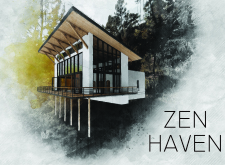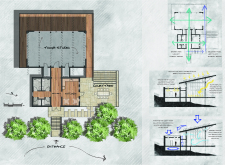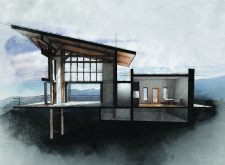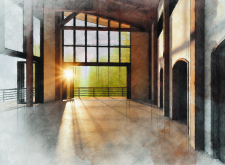5 key facts about this project
ZEN HAVEN is a thoughtfully designed structure that balances sustainability and wellness. Located in a tranquil setting, it serves multiple functions such as a yoga studio, kitchen, and storage spaces. The design encourages interaction among users while promoting a sense of peace. The overall concept focuses on integrating natural elements, light, and open space, creating an environment that supports physical and mental well-being.
PRIMARY AXES AND SPATIAL ORGANIZATION
The layout of ZEN HAVEN relies on primary and secondary axes that guide movement through the building. These primary axes function as main pathways, linking various internal spaces. Secondary axes connect to outdoor areas, providing an easy transition from inside to outside. This design approach fosters interaction between users and their environment, enhancing the overall experience of the space.
SUSTAINABILITY STRATEGIES
A key feature of ZEN HAVEN is the photovoltaic array, which converts solar energy into electricity. This design decision prioritizes renewable energy, contributing to the building's efficiency. The courtyard plays an essential role as well, allowing ample natural light through well-placed windows and skylights. This design choice helps to minimize the need for artificial lighting during the day, making the space both functional and environmentally friendly.
WATER MANAGEMENT AND THERMAL COMFORT
Water management is addressed through a system that collects and purifies rainwater and gray water. This reduces overall water consumption, making the building more sustainable. In addition, the design includes a thermal mass system that absorbs solar energy. It effectively redistributes heat throughout the building, contributing to consistent warmth and comfort for occupants.
VENTILATION AND AIR QUALITY
Operable windows are located throughout the main space to enhance ventilation. This design feature allows fresh air to circulate, improving indoor air quality. The strategic placement of these windows not only extends comfort but emphasizes the building's connection to nature. Fresh breezes and natural light fill the interiors, creating a lively atmosphere from morning till dusk.























































